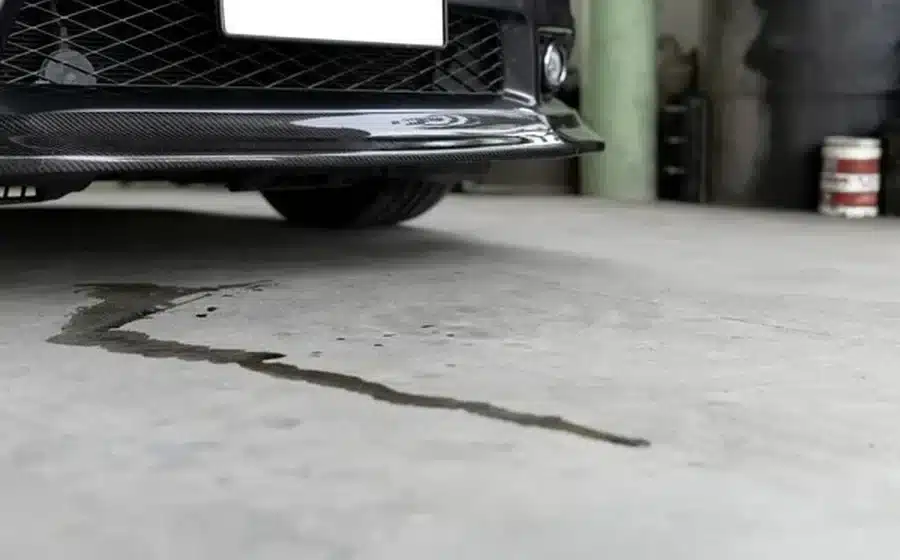Do you know how much an oil leak in your car can cost you?
Knowing the vehicle repair costs is key for car owners. The repair price can change a lot. This depends on how bad the leak is and what kind of car you have.
Getting the right estimates is important for planning your budget. An oil leak repair cost calculator can help. It lets you guess how much you’ll spend and make smart choices about your car’s care.
Understanding Oil Leaks: Common Causes
Knowing why oil leaks happen is key for car owners to avoid expensive fixes later. Oil leaks can come from many places. Spotting these causes helps prevent damage and understand how much does oil leak repair cost.
Several things can cause oil leaks. Knowing them helps in taking steps to prevent problems. Common causes include worn seals and gaskets, oil pan damage, and oil filter issues.
Worn Seals and Gaskets
Worn seals and gaskets often lead to oil leaks. They wear out due to heat, pressure, and age. Regular checks can spot these problems early.
Fixing or replacing seals and gaskets can cost differently based on your car and where you live. Knowing these costs helps plan for oil leak repairs.
Damage to Oil Pan
The oil pan can get damaged by road debris, accidents, or bad installation. This damage can cause oil leaks. Fixing or replacing a damaged oil pan can be pricey, adding to the cost of oil leak repair.
It’s important to check the oil pan often, more so after driving in areas with lots of debris or after an accident. Quick repairs can prevent more damage.
Faulty Oil Filter
A bad oil filter can also cause leaks. If the filter isn’t tight or is damaged, oil can leak out. Regular oil filter checks during maintenance can stop these problems.
Changing a bad oil filter is simple and can be done during routine maintenance. But, if you miss the leak early, it can lead to bigger issues, affecting the oil leak repair cost.
In summary, knowing why oil leaks happen is crucial for car care. By understanding these causes and taking steps to prevent them, car owners can avoid leaks and their repair costs. Regular checks and maintenance are key to catching problems early.
Factors Affecting Repair Costs
Knowing what affects oil leak repair costs is key for car owners. The price to fix an oil leak varies a lot. This is due to several important factors.
Type of Vehicle
The type of car you have greatly influences repair costs. Different cars have engines that are more or less complex. This complexity can change the repair’s cost and effort needed.
- Luxury cars often need pricier parts and more labor.
- Older cars might have engines that are easier to get to, which can lower labor costs.
- Cars with turbochargers have more complex engines. These need special skills to fix.
Location of the Leak
Where the oil leak is also matters a lot. Leaks in hard spots make repairs harder and more expensive.
Common spots for oil leaks include:
- The oil pan gasket.
- Valve cover gasket.
- Oil filter housing.
Each spot has its own set of challenges and costs.
Labor Costs
Labor costs are a big part of oil leak repair costs. The repair’s complexity and the mechanic’s rate can change the total cost a lot.
Things that affect labor costs include:
- The mechanic’s experience.
- The shop’s location and reputation.
- How long it takes to fix the problem.
By understanding these factors, car owners can guess the average cost of oil leak repairs. This helps them make smart choices about their car’s upkeep.
Average Cost of Oil Leak Repairs
Oil leak repair costs depend on several factors. It’s important to know the national averages and regional differences. The cost changes based on the vehicle type, leak location, and labor costs.
National Averages
The average cost for oil leak repairs is between $200 and $1,000. This range comes from the different complexities of repairs. For example, fixing a simple oil leak can cost between $200 to $300.
More complicated repairs, like fixing the oil pan or head gasket, can cost over $1,000. The median cost in the U.S. is about $500.
| Type of Repair | Average Cost |
| Simple Oil Leak Fix | $200 – $300 |
| Complex Oil Leak Repair | $500 – $1,000 |
| Oil Pan Replacement | $300 – $800 |
Regional Variations
Regional differences also affect oil leak repair costs. Labor costs, taxes, and living costs vary by state and city. This impacts the overall repair cost.
Cities with high living costs, like San Francisco or New York, have higher labor costs. This makes repairs more expensive. On the other hand, smaller towns with lower living costs might offer better prices for the same repairs.
Regional Average Costs:
| Region | Average Cost Range |
| Northeast | $250 – $700 |
| South | $200 – $600 |
| West Coast | $300 – $900 |
| Midwest | $220 – $550 |
Knowing these regional differences helps car owners plan and budget for oil leak repairs better.
DIY vs. Professional Repairs
Choosing between DIY and professional oil leak repairs is a big decision. Each option has its own advantages and disadvantages. Knowing these can help you decide what’s best for you and your budget.
Pros and Cons of DIY
DIY repairs can save you money on labor. But, you need to think about the repair’s complexity and your skills. Simple tasks like tightening connections or changing the oil filter are doable by yourself. Yet, fixing or replacing gaskets and seals might need special tools and knowledge.
Pros of DIY:
- Cost savings on labor
- Immediate action if you have the necessary parts
- Learning experience for DIY enthusiasts
Cons of DIY:
- Risk of incorrect diagnosis or repair
- Lack of specialized tools and expertise
- Potential for making the problem worse
When to Hire a Mechanic
Professional mechanics ensure the job is done right and fast. They have the right tools, experience, and knowledge for accurate repairs. Even though it might cost more at first, it can save you money in the long run by avoiding more damage.
| Repair Type | DIY Cost Estimate | Professional Repair Cost Estimate |
| Simple Oil Leak (e.g., loose connection) | $20-$100 | $100-$300 |
| Moderate Oil Leak (e.g., oil filter replacement) | $50-$200 | $200-$500 |
| Complex Oil Leak (e.g., gasket replacement) | $100-$500 | $500-$1,500 |
Looking at DIY and professional repair costs, the issue’s complexity is key. For small problems, DIY might be fine. But for bigger issues, a professional is usually the better choice.
Repair Estimates: What to Expect
Knowing what affects oil leak repair cost factors helps you make smart choices. When you get a repair estimate, it’s not just the total cost. It’s about understanding what makes up that cost.
Getting quotes from different service providers is key. It lets you see average costs in your area. Plus, it helps you find the best and most affordable service.
Getting Multiple Quotes
Getting multiple quotes is a must. It lets you compare prices and services from different mechanics or shops. When asking for a quote, give all the details about the problem. Include any symptoms and past repairs related to the oil leak.
Tips for getting accurate quotes:
- Provide a clear description of the problem.
- Ask for a detailed breakdown of the costs.
- Inquire about any additional fees or charges.
Breakdown of Costs
A detailed breakdown of costs is crucial. The cost of oil leak repairs usually includes parts and labor. The part cost varies based on your vehicle and the needed components.
| Cost Component | Description | Estimated Cost Range |
| Parts | Gaskets, seals, oil pan, etc. | $50 – $500 |
| Labor | Mechanic’s labor costs | $100 – $300 |
Understanding these oil leak repair cost factors helps you judge if a quote is fair. By comparing quotes and knowing the cost breakdown, you can choose wisely for your oil leak repair.
Preventing Oil Leaks
Regular maintenance is key to preventing oil leaks and ensuring your vehicle runs smoothly. By taking proactive steps, you can reduce the risk of oil leaks. This avoids costly repairs, which can vary widely in oil leak repair price range.
Regular Maintenance Tips
To prevent oil leaks, it’s essential to follow a regular maintenance schedule. This includes checking your vehicle’s oil level regularly. Also, look for signs of leaks, such as puddles under your vehicle or oil spots on the ground.
- Check your oil levels regularly to ensure they’re at the recommended level.
- Inspect your vehicle for signs of oil leaks, such as oil spots or drips.
- Replace worn-out seals and gaskets to prevent future leaks.
The Role of Oil Changes
Regular oil changes play a crucial role in preventing oil leaks. Fresh oil keeps your engine clean and reduces damage to seals and gaskets. It’s also a chance to inspect your vehicle for any potential issues.
Timely oil changes can help extend your vehicle’s engine life and prevent oil leaks. Always follow the oil change schedule in your vehicle’s owner’s manual.
Insurance Coverage for Oil Leaks
Knowing what your insurance covers can help lower the cost of fixing oil leaks. Car owners often face surprise bills for oil leaks. But, if you know what your policy includes, you can save money.
Policy Details to Check
First, look at your insurance policy. See if it covers engine damage or oil leaks. Some policies might help if the leak was caused by an accident or other covered events.
- Check the type of coverage you have: Comprehensive, Collision, or Liability.
- Review the policy’s terms and conditions regarding engine damage.
- Look for any exclusions or limitations related to oil leaks.
A study by the Insurance Information Institute shows that comprehensive coverage often includes engine damage. This might cover oil leak repairs under certain conditions.
Filing a Claim
If your policy does cover oil leak repairs, you need to file a claim. Here’s how to do it:
- Notify your insurance provider as soon as you find the oil leak.
- Send them detailed documentation, like photos of the leak and repair estimates.
- Follow their instructions for the claim process.
As Consumer Reports says, “Filing a claim quickly and with good documentation can greatly affect your claim’s outcome.”
| Insurance Coverage Aspect | Description |
| Comprehensive Coverage | Covers damage to your vehicle not caused by a collision, potentially including oil leaks. |
| Collision Coverage | Covers damage to your vehicle resulting from a collision, which may include oil leaks caused by an accident. |
| Liability Coverage | Covers damages to others in an accident; typically does not cover oil leak repairs. |
Understanding your insurance and how to file a claim can help manage repair costs. Always check your policy and talk to your insurance provider to make sure you’re covered.
Signs You Need an Oil Leak Repair
It’s important to spot an oil leak early to avoid engine damage and expensive fixes. Keeping an eye out for signs can save you money and hassle. Catching an oil leak quickly is key to keeping your car running well.
Warning Lights on Dashboard
The oil pressure light on your dashboard is a clear warning. It means your oil pressure is low, possibly due to a leak. Always check your oil levels and act fast if they drop. If the light turns on, pull over and check your oil right away.
Puddles under Your Vehicle
Seeing oil puddles under your car is a big clue. If you find oil spots, it means there’s a leak. The spot’s location can hint at where the leak is. For example, oil at the front might mean a problem with the oil filter or drain plug.
Spotting an oil leak means it’s time to get a mechanic’s help. They can find the leak and give you a detailed repair cost. This helps you understand the costs and plan the repairs to fix your car.
Conclusion: Making Informed Decisions
Knowing the costs of oil leak repairs is key for car owners. The price can change a lot based on the car type, leak location, and labor costs. By looking at these factors and the average repair costs, you can make smart choices for your car’s upkeep.
Assessing Your Options
When you find an oil leak, it’s important to think about your repair choices. Get quotes from trusted mechanics and check the cost details to make sure you’re paying a fair price. Knowing the repair cost helps you plan your budget.
Timely Repairs Matter
Fixing oil leaks quickly is crucial to avoid bigger problems. Waiting too long can make repairs much more expensive. Fixing leaks fast keeps your car running well and saves you money in the long run.
FAQ
How much does it typically cost to repair an oil leak?
Oil leak repairs can cost between $100 and $500. This depends on your vehicle, where the leak is, and labor costs. An oil leak repair cost calculator can give a better estimate.
What factors influence the cost of oil leak repairs?
Several things affect the cost of fixing an oil leak. These include your vehicle type, where the leak is, and labor costs. Knowing these can help you guess the repair cost.
Can I repair an oil leak myself, or should I hire a professional mechanic?
You can try fixing an oil leak yourself, but it’s important to consider the risks. For tricky problems, it’s best to get a professional mechanic. Comparing DIY and professional costs can help you decide.
How can I get an accurate oil leak repair cost estimate?
For a precise estimate, ask for quotes from trusted mechanics and compare them. Knowing what affects these estimates can help you choose wisely.
Are oil leak repairs covered by insurance?
Insurance for oil leaks depends on your policy. Always check with your insurance to see what’s covered. This can help lower your repair costs.
What are the signs that indicate I need an oil leak repair?
Signs like dashboard lights and oil puddles under your car mean you might have a leak. Spotting these signs early can prevent more damage.
How can I prevent oil leaks from occurring in the first place?
Regular maintenance, like timely oil changes, can prevent leaks. Following these tips can lower the chance of leaks and save you money.
What is the average cost range for oil leak repairs?
Oil leak repairs usually cost between $100 and $500. But, the actual price can change a lot. This depends on your vehicle and labor costs.



